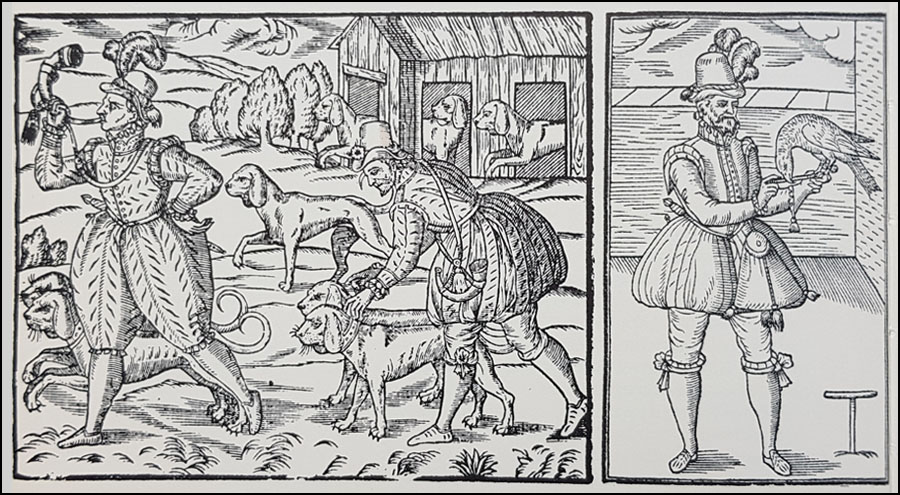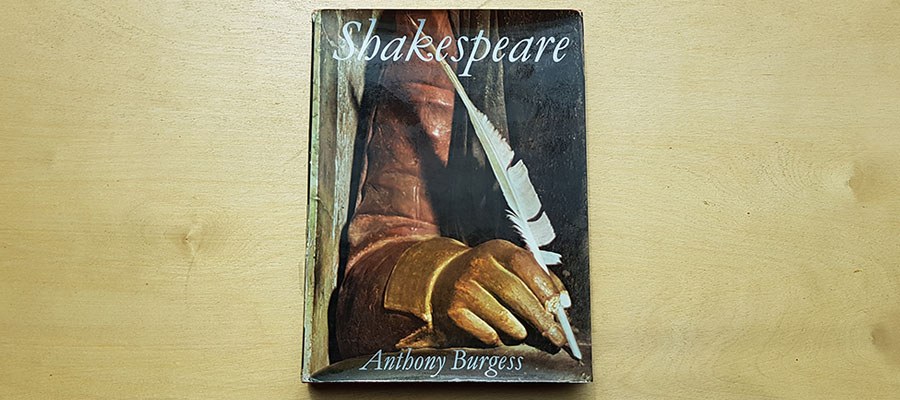Clever-clever: Critiquing Anthony Burgess’s Shakespeare biography
-
Will Carr
- 25th August 2020
-
category
- Blog Posts

Anthony Burgess’s Shakespeare was published in 1970 by Jonathan Cape as a lavishly illustrated folio-sized volume. Burgess described his biography as a way of using up the research he had undertaken for a film about Shakespeare’s life that he’d written for Warner Brothers, commissioned in 1968 and cancelled three years later.
The UK hardback edition of 1970 is a vigorous, colourful, extravagant, even fanciful portrait of Shakespeare’s life and times, balanced by sharp observations about each of his plays.
In the second volume of his memoirs, Burgess notes that he ‘understood that the true Shakespeare scholars of Princeton thought little of the text, but that was to be expected.’ It is clear that he paid attention to the opinions of the reviewers.
Although the majority of American critics were positive about the book, Burgess notes that ‘disparagement came from my native country,’ and he quotes several negative reviews from the British press. As he writes in You’ve Had Your Time:
The Tablet, for instance, found ‘the captions … coy, clever-clever, or muddled. Plain factuality would have helped matters. Burgess plainly does not know the religion of Shakespeare’s home and district, and his groundless attack on Shakespeare’s wife leads you to think that the biographer had known and hated her most of his life. One gets a strong feeling that Burgess had little heart for the work.’ Unjust.
The Economist said: ‘His scholarship is defective, and the chronological order of the plays is either based on outmoded, or crankily hypothetical theories. The literary opinions are wilfully odd and coarse; they suggest that Burgess is carelessly writing down for an ignorant public.’
The criticism of Burgess’s ‘groundless attack’ on Anne Hathaway was developed in 2007 by Germaine Greer in her biographical study titled Shakespeare’s Wife. Greer’s polemical account of Anne Hathaway’s life seeks to counter the traditional portrayal of her by male critics as having been an impediment to Shakespeare’s creativity.

The Shakespeare marriage has often been portrayed in negative terms, with attention given to the age difference between William and Anne, their hasty wedding, Shakespeare’s long absences in London, and the curious legacy to his wife of ‘the second-best bed’. These facts have often been combined to conclude that Shakespeare’s marriage was unhappy, detached, or perhaps merely transactional. Greer’s book sets out to reassess what is known about Anne Hathaway, presenting a fresh view.
One of her targets is Burgess, who speculates in his Shakespeare biography that ‘Will’ (as he calls him) married the wrong woman. Here is Burgess:
It is reasonable to believe that Will wished to marry a girl called Ann Whateley … Sent on skin-buying errands to Temple Grafton, Will could have fallen for a comely daughter, sweet as May and shy as a fawn. He was eighteen and highly susceptible. Knowing something about girls he would know that this was the real thing. Something, perhaps, quite different from what he felt about Mistress Hathaway of Shottery.
Greer points out that Burgess has invented the beauty and temperament of Anne Whateley, about whom very little is known, and he characterises the older Anne Hathaway as ‘Mistress’, presenting her as ‘forbidding, spinsterish, schoolmarmy even.’
Greer goes on to argue that Burgess stigmatises Ann Hathaway as promiscuous, rather than ‘chaste, not wanton and forward’ like Anne Whateley; and he claims to have a knowledge of Shakespeare’s inner feelings, again not recorded, when he decides to marry: ‘Will gave in, with bitter resignation, and was led to the slaughter, or the marriage bed.’
Greer’s critique of Burgess is part of the wider intention of her book to point out the failings of mainstream (mostly male) approaches to Shakespeare’s biography. Yet Burgess makes no claims for the accuracy of his historical research, and indeed he takes pains, throughout the text of Shakespeare, to draw attention to the speculative nature of his statements. More than once he describes his ideas as ‘very unsound’, and introduces overt literary techniques to his telling of Shakespeare’s story, such as when he begins a particularly extravagant passage of description: ‘This is the moment for the traditional florid cadenza to mark Will’s first glimpse of London. Very well, then.’
In the light of this evidence from Burgess’s text, it is helpful to place Burgess’s Shakespeare in relation to his other creative work about Shakespeare, especially the novels Nothing Like The Sun and Enderby’s Dark Lady, in which Shakespeare appears both as a fictional character and as a way of thinking about the nature of fiction and biography.
Germaine Greer has made a more recent engagement with Burgess’s work in her fascinating essay ‘Dirty Books and Laughing Stocks’, published in 2018, alongside the text of Burgess’s famous anti-censorship lecture delivered at the University of Malta in 1970, ‘Obscenity and the Arts’. On this occasion, Greer places Burgess’s writing in the context of the counter-culture of the period and various legal threats to artistic free expression, both in Malta and in Britain. Greer’s contribution to the book is a polemical critique which engages in detail with Burgess’s lecture on obscenity, which eventually resulted in the confiscation of his home by the Maltese authorities.


